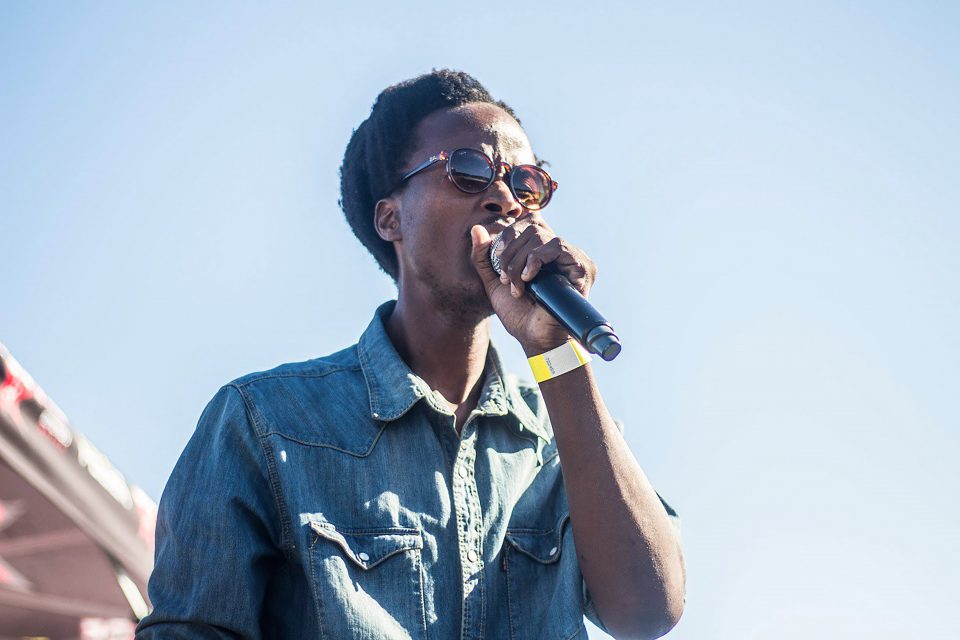The working-class texture of Ndlulamthi’s music
The spaza artist raps about the harsh realities faced by black people in Cape Town townships, giving perspectives on issues often left out of the mainstream media.
Author:
5 September 2019

In the Mother City, many hip-hop artists are working-class citizens who face the same challenges as their fans. One such artist is Ndlulamthi.
The married father works in the courier industry and has lived in Cape Town townships such as New Crossroads, Khayelitsha, Gugulethu and Philippi. In his second album, 2018’s Hard Livings, he raps about the township life most black people in the Western Cape lead. His lyrics are about the pains of growing up in a place, calling it home, but refusing to raise your own children in it. He covers issues such as gun violence, vigilantism, alcohol abuse and poverty, among other everyday realities for black people in the Cape.
Ndlulamthi is one of the most respected lyricists in Cape Town hip-hop. The rapper and poet is the classic example of a spaza artist. Spaza is a subgenre of hip-hop that originates in Cape Town, and is defined by lyrics that are delivered in a mixture of IsiXhosa and Cape Town slang.
Related article:
Like the majority of the Cape Town subgenre’s artists – including Kanyi, Driemanskap and Rattex – Ndlulamthi’s lyrics are deeply rooted in a music form defined by social consciousness and commentary. The beats are mostly a 1990s-inspired East Coast production, an aesthetic favoured by those who grew up in the 1990s and early 2000s.
Ndlulamthi is a mainstay on Cape Town’s underground rap circuit. He became a crowd favourite through a consistent string of live performances. Most spaza rappers give raucous shows, but Ndlulamthi’s sets are the opposite. He commands attention from his audience by rapping in a conversational tone that can turn a pack jam into an intimate concert, at least for the duration of his set.
After consistent live performances, fans started begging Ndlulamthi for an album. He delivered his debut body of work, Isibhilivane (The Love Note), in 2013. The album depicted black life, looking at how the migrant labour system breaks families apart and exploring the concept of freedom. Delivered in his conversational tone, the artist feels relatable, seeing the world in a way that resonates with many affected by similar circumstances.
Hard Livings
Released last year, Ndlulamthi’s second album, Hard Livings, is only nine songs long. Still, it paints a detailed picture of life the townships. The album’s title has a double meaning, the first is literal: life in Cape Town is hard for black people. The second is a reference to the Western Cape gang called Hard Livings. “It’s not because I glorify the lifestyle, but because ganging is more of the friends or the brotherhood you tend to keep,” says the artist, whose birth name is Sizakele Gegana. Still, it is more complex, given the present violent realities.
He speaks of his rap persona as an “imaginary character”, saying, “I think I gave up my own life for him. I could have easily been one of your forgotten nobodies, but he has kept me far from the troubles of my youthful years up till parenthood. He makes thoroughly sure I find closure, peace and overstanding by just letting me express my inner through rhymes.”
Related article:
Ndlulamthi raps with the sensitivity and authority one can only have after spending time in townships. On Hard Livings, he shares his observations and theories about the current state of affairs. For instance, on the song Gun Dubula he raps intimately about gun violence. What brings his listener closer to the story is how Ndlulamthi relates the lives of these men as though they were people he knows personally – because they are. He knows where they stay, their names. He even refers to them as “umntwakwethu [my brother]”. He gives a perspective on gun violence rarely heard on mainstream media platforms, which draws attention to the structural nature of our present devastating reality.
Ndlulamthi has the ability to get people thinking and talking about the issues that are affecting them, at times forcing them to reconsider their perspective. “The music I make … reacts with your mind’s mechanisms,” Ndlulamthi said in 2015.
In 2014, Ndlulamthi released the song Andivoti, in which he gave his reasons for not voting. He went through all the notable political parties, and broke down why they were flawed and weren’t any different from the next. There was no party worth his vote, so he wouldn’t be voting. A lot of people felt that way during the most recent elections, too. The song started a robust debate on social media and still gets referenced by his cult following whenever ballots need to be crossed.
The Johannesburg connection
But, just like that of many musicians of his kind, Ndlulamthi’s music has failed to travel further than the Western and Eastern Cape, where most Cape Town rappers have huge fanbases. If a Cape Town artist wants to expand, the solution is usually to relocate to Joburg or at least to make frequent trips there. Dee Koala, Uno July, Patty Monroe and YoungstaCPT are a few artists whose music is travelling nationally because of the bases they have built in Johannesburg.
Ndlulamthi says the challenge is bigger than music. “The cradle of success in South Africa started in Joburg,” he said in 2015. “There isn’t anything you can do in another place that didn’t start in Joburg … So, to me, personally, Cape Town is in its own place. It’s behind Joburg, because Joburg, as small as it is, has a lot of opportunities, more than in Cape Town.”

